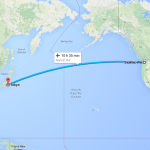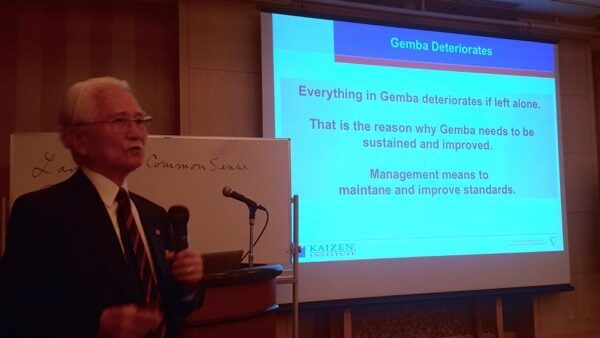 The ideas, principles, and methods that we'd recognize as “Lean” aren't exclusively of Japanese origin. Many of us, myself included, draw inspiration from Toyota, reading books about them and visiting their factories. For me, I've had a chance to visit Toyota plants in Japan, California, and Texas, and the story is very consistent.
The ideas, principles, and methods that we'd recognize as “Lean” aren't exclusively of Japanese origin. Many of us, myself included, draw inspiration from Toyota, reading books about them and visiting their factories. For me, I've had a chance to visit Toyota plants in Japan, California, and Texas, and the story is very consistent.
As Masaaki Imai said during the opening session of our Japan Tour, Kaizen and Lean are “not just a Japanese approach… it's just a good approach… it's simply a good managerial approach.”

This approach works well for Toyota in different countries and it works well in different industries, including healthcare. Lean is not a way of building cars better… it's a way of managing, leading, and improving better.
Toyota learned from the early books of Henry Ford. An American, Dr. W. Edwards Deming was incredibly influential to Toyota and other Japanese companies. It's probably fair to say that the Toyota management system is a combination of some early Henry Ford ideas, Dr. Deming, and their own innovations. This approach is not predicated on the Japanese national or social culture… since the roots are not all Japanese, these ideas work in other countries, and it's not naturally easy to “be Lean” in Japan.
We see great Lean thinkers in other countries and there's evidence that not all Japanese companies (or hospitals) are somehow inherently Lean.
So, the great news is that we can learn from each other.
A number of American hospitals take trips to Japan to learn about Lean. These include Virginia Mason Medical Center, Seattle Children's Hospital, and Salem Health. ThedaCare has not gone this route, choosing to visit and learn from manufacturing companies in Wisconsin and around the U.S., along with learning through the Healthcare Value Network efforts. After my own two trips, I'd conclude that going to Japan is fascinating and a great experience, but it's not absolutely necessary as a way to learn Lean.
During my trips, I found it useful to visit both factories and hospitals and I know the physicians and healthcare leaders from the world agreed.
Visiting factories stretches people's minds because it forces them to think through Lean in an unfamiliar setting. I know of at least one hospital system that goes to Japan and refuses to visit any of their hospitals for a number of reasons. When you know hospitals really well and you visit other hospitals, you run the risk of focusing on the hospital details, such as this hospital is different than yours, or you end up asking detailed clinical questions that don't have anything to do with Lean
Also, if you went and only visited hospitals, you'd have to protect against the “benchmarking trap” where hospitals go and visit and try to copy specific practices or artifacts instead of looking for deeper underlying principles to learn from.
Two of the hospitals we visited in this most recent trip explained how they learned about Lean by visiting hospitals in the United States (in Seattle and Boston). One was inspired to start their Lean journey when Dr. Gary Kaplan, the CEO of Virginia Mason Medical Center visited and gave a talk about Lean. I've anecdotally heard stories about other Japanese hospitals flying to Seattle to see Lean healthcare first hand.
So, Virginia Mason flies to Japan to learn from Japanese factories and some Japanese hospitals fly to Seattle to learn from Virginia Mason… but they don't necessarily visit Toyota in Japan. Why? Some say, “We're different, we're not a factory.” I think the world is better off for having these exchanges, even if there is extra travel cost involved. Virginia Mason could learn only from local Seattle manufacturers, like Boeing and Genie. The Japanese hospitals could take a short trip to Toyota City.
In one other interesting example of lessons going back and forth, I met a woman in Japan who worked in Virginia Mason's “kaizen promotion office”(KPO) for many years. She was born in Japan and is bi-lingual. She's currently living and working back in Japan, as the assistant KPO director at a hospital.
There are, clearly, cultural differences between Japan and other countries. But Lean principles are pretty universal. People want to provide the best patient care and they want to be listened to. I was asked to give a presentation about global Lean healthcare trends at one of the Japanese hospitals. During the Q&A time, the hospital CEO asked me, “Japan is a group-oriented culture. How does Lean work in the United States when it's a more individual-focused culture?”
I replied that Americans are willing to work in teams. We love team sports. We participate in teams at work when we have goals that are shared and when we have good leadership. It's an important part of the Japanese culture to maintain harmony, which often means people don't make waves or point out problems. That's one way in which a “Lean culture” is not exactly the same as Japan's culture. And Lean isn't exactly the same as the Western culture… yet Lean works. As we learn more from each other, we'll find more common ground in the problems we are trying to solve and the better patient care that we're trying to delivery.
Please scroll down (or click) to post a comment. Connect with me on LinkedIn.
Let’s build a culture of continuous improvement and psychological safety—together. If you're a leader aiming for lasting change (not just more projects), I help organizations:
- Engage people at all levels in sustainable improvement
- Shift from fear of mistakes to learning from them
- Apply Lean thinking in practical, people-centered ways
Interested in coaching or a keynote talk? Let’s talk.
Join me for a Lean Healthcare Accelerator Trip to Japan! Learn More










Yes, we should learn from others and other industries. What is often missing from Lean transformations is learning within our own organizations. Toyota learned much from Ford and Deming, but then spent more than a generation adapting and supplementing those concepts in developing their own management system. I find it remarkable that many in healthcare fail to recognize the need to adapt and supplement lessons from Toyota for not only their own industry, but for their own organization. It is myopic to believe that a management system specifically designed around assembly line or work-cell production is the optimum management system for healthcare. And worse than the “my way or the highway” (which you have been critical of in the past) approach to Lean implementation, is the frequent neglect to include leadership problem solving as an essential aspect of a Lean adaptation for healthcare. Toyota teaches (I read it somewhere) that it takes 20 to 30 years to develop proper Lean thinking leaders. How many healthcare organizations have spent millions on their Lean efforts but don’t have a long-term plan for developing or upgrading the problem solving skills for future and existing leaders? I know of at least two healthcare organization that do; one you frequently write about and another even larger organization that you won’t hear about because their initial efforts are almost entirely about developing Lean thinking leaders in order to design the Lean management system for their organization.
I agree that people need to learn from others, but adapt things to their own industry and their own organization, as I blogged about here:
“Read this Book – But Don’t Copy ThedaCare“
Hi Mark
I have my whole life believed there is always something to learn from unrelated businesses, in fact you often learn more from those that have no relationship to you than those that do, because industries often get stuck into group think. Take the North American auto industry, for the most part they take great pain to avoid bringing in people from different industries, yet it was an aircraft industry guy that turned around Ford without a bailout, while the jury is still out if the other two will turn around or be back in trouble with the next economic downturn.
Two highly successful Canadian banks that grew extensively during the last economic crash, did so because long ago they started to learn from other industries, they even have brought non-bankers into their organization to challenge status quo thinking.
Locally I know one hospital that has been steadily improving their performance despite the challenges they get thrown, and much of it is due to their hiring a CEO who had nothing to do with healthcare. Instead of coming in with preconceived ideas he went to his people to find and help him address the problems. Doing so has had a major effect on how his staff perform and on the care the patient get from the hospital. Often one of the biggest challenges improvement efforts face is those involved having to narrow a range of thought, fresh ideas rarely ever come from within.
I’ve been able to introduce people in Seattle to learn from each other… one who is involved with Lean at a major coffee company and one who is a leader in the nutrition services are of a children’s hospital. The learning can go in all directions…
See my comment on this post about how, perhaps, a hotel and hospital could collaborate in their community to learn from each other and all improve.
[…] As I wrote about here, Lean isn’t so much a set of Japanese ideas as much as it’s a set of ideas that keep going back and forth across the Pacific. American hospitals go to visit Toyota in Japan. Some Japanese hospitals travel to Seattle to learn Lean from hospitals there… instead of taking advantage of local Toyota resources. Why? Because the Japanese hospitals have as much of a bias against learning from outside industries as hospitals in other countries! Interesting, eh? […]
Mark – It’s fun to see your “Throwback Thursday” post, particularly this one as it is a topic that you and I have been exchanging ideas about a lot over the past year since I’ve moved to Japan.
The learning exchange across the Pacific is something fundamental to the development of TPS/lean and its ongoing evolution.
A hot topic right now in Japan is how the Japanese can learn more about the “Silicon Valley” style approach (really the “Lean Start-up” movement) and apply it to advance Japan’s approach to innovation and product development.
And, as you pointed out, Japanese hospitals are learning more about Lean perhaps from U.S. hospitals than they are from their domestic manufacturing experts. All very interesting!